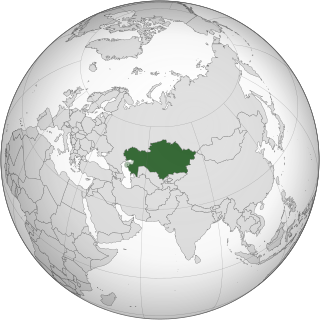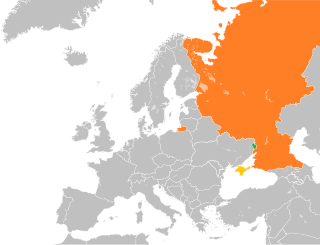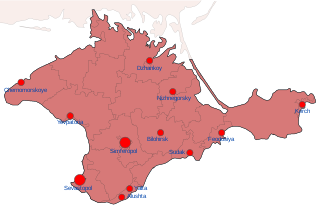Simeiz is a resort town, an urban-type settlement in Yalta Municipality in the Autonomous Republic of Crimea, a territory recognized by a majority of countries as part of Ukraine and incorporated by Russia as the Republic of Crimea. Its name is of Greek origin. The town is located by the southern slopes of the main range of Crimean Mountains at the base of Mount Kosh-Kaya, 18 kilometers (11 mi) west from Yalta. Population: 2,604 .

Lesbian, gay, bisexual, and transgender people in Kazakhstan face legal challenges not experienced by non-LGBT citizens. Both male and female same-sex sexual activity are legal in Kazakhstan, but same-sex couples and households headed by same-sex couples are not eligible for the same legal protections available to opposite-sex married couples.

The Luhansk People's Republic or Lugansk People's Republic is an internationally unrecognised republic of Russia in the occupied parts of eastern Ukraine's Luhansk Oblast, with its capital in Luhansk. The LPR was proclaimed by Russian-backed paramilitaries in 2014, and it initially operated as a breakaway state until it was annexed by Russia in 2022.

Igor Venediktovich Plotnitsky is a former Ukrainian separatist leader who served as the head of the self-proclaimed Luhansk People's Republic, in eastern Ukraine, from 14 August 2014 to 24 November 2017. He was born 26 June 1964 either in Luhansk or in the town of Kelmentsi, Chernivtsi Oblast. Plotnitsky himself did not issue a public statement on 24 November 2017, but on that day a Luhansk People's Republic website claimed he had resigned as their president. On 25 November the 38-member People's Council of the self-proclaimed state unanimously approved Plotnitsky's resignation.
Russian intelligentsia expressed various reactions to the Russian annexation of Crimea.

Russian irredentism, sometimes expressed by the term Greater Russia, refers to territorial claims made on behalf of the Russian Federation to parts of the former Russian Empire and the former Soviet Union. It seeks to politically incorporate Russians who are living in territories that fall outside of Russia's modern borders.

Leonid Ivanovich Pasechnik is a Ukrainian-born politician who has served as Head of the Luhansk People's Republic (LPR) since 2017. He holds the position in acting capacity ever since the illegal and unrecognized Russian annexation of Donetsk, Kherson, Luhansk and Zaporizhzhia oblasts in 2022. Pasechnik had previously held office as the LPR's Minister of State Security from 2014 to 2018.

Aleksandr Aleksandrovich Bednov was a former Soviet and Ukrainian militsiya officer and rebel commander of the self-proclaimed Luhansk People's Republic in Ukraine. He was the leader of the pro-Russian Batman Rapid Response Group. He was assassinated in Luhansk, with a debate among his supporters on who was responsible although on the day of his killing LPR "prosecutor's office" issued an official statement confirming "liquidation" of Bednov as "a head of a criminal organization".

The 22nd Army Corps is a corps of the coastal defence troops of the Black Sea Fleet of the Russian Navy. Formed in 2017 after the annexation of Crimea by the Russian Federation, the corps is headquartered in Simferopol and controls units based in Crimea.

Ruslan Ismailovich Balbek is a Russian and former Ukrainian politician and former member of the State Duma from the United Russia party. A supporter of the annexation of Crimea by the Russian Federation, he has been highly critical of the Mejlis.
The Interbrigades is a volunteer movement organized by the unregistered Russian National Bolshevik political party "The Other Russia" to participate in the armed conflict in eastern Ukraine on the side of the Donetsk People's Republic and the Luhansk People's Republic.
The Tashkent Ten were ten Crimean Tatar civil rights activists tried in Tashkent by the Uzbek Supreme Court from 1 July to 5 August 1969. The trial was sometimes called the Tashkent Process.
2022 in Russia is the 31st year of the Russian Federation.

Luhansk People's Republic–Russia relations were bilateral relations between Russia and the Luhansk People's Republic (LPR). The LPR is widely internationally unrecognized, with most of the international community regarding the LPR as a Russian military occupation of a portion of Ukraine's Luhansk Oblast. The LPR was annexed by Russia on 30 September 2022; the LPR authorities willingly acceded to Russia, and the annexation is widely internationally unrecognized. From April 2014 to September 2022, the LPR portrayed itself as an independent state, and it was widely regarded as a puppet state of Russia by the international community.
The 2022 evacuation of the Donetsk People's Republic and the Luhansk People's Republic refers to mass evacuation of the residents of the self-proclaimed Donetsk People's Republic (DPR) and Luhansk People's Republic (LPR) to the Russian Federation starting in February 2022.
In late September 2022, in the context of the Russian invasion of Ukraine, Russian-installed officials in Ukraine staged so-called referendums on the annexation of occupied territories of Ukraine by Russia. They were widely described as sham referendums by commentators and denounced by various countries. The validity of the results of the referendums has been accepted by North Korea, and no other sovereign state.

The Russian occupation of Crimea is an ongoing military occupation within Ukraine by the Russian Federation, which began on 20 February 2014 when the military-political, administrative, economic and social order of Russia was imposed on the Autonomous Republic of Crimea and Sevastopol. The occupation of Crimea and Sevastopol was the beginning of the Russo-Ukrainian War.

Martial law in Russia was introduced on 20 October 2022 during the ongoing Russian invasion of Ukraine and a month after the announcement of mobilization. President Vladimir Putin issued two decrees: "On the introduction of martial law in the territories of the DPR, LPR, Zaporozhye and Kherson Oblasts" and "On measures taken in the constituent entities of the Russian Federation in connection with Decree of the President of the Russian Federation dated October 19, 2022 No. 756".
Igor Aleksandrovich Kornet born 29 April 1973, in Voroshilovgrad, now Luhansk, is a Ukrainian militiaman, public official and separatist, since 2014 Minister of Interior of the Luhansk People's Republic.

Donuzlav is an air base near Lake Donuzlav in Crimea, Ukraine. The air base was decommissioned in 1995, but has been claimed to have been revived by the Russian military since the Russo-Ukrainian war.
![Marchers at the KyivPride [uk] event in 2019 IAN76774.jpg](http://upload.wikimedia.org/wikipedia/commons/thumb/8/81/IAN76774.jpg/220px-IAN76774.jpg)











